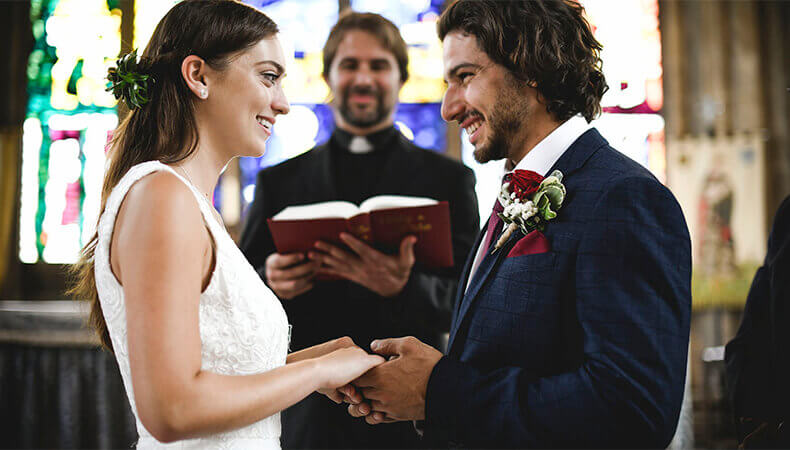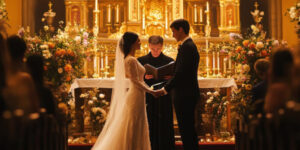Vows at a wedding are more than just words; they are a significant—and personal—part of the wedding ceremony. They are a promise that you make to your significant other. Wedding vows are of two types: traditional and personalized.
Traditional vows are the ones that have been used repeatedly and have been passed down through generations. Personalized Wedding Vows are vows written by the Groom and Bride. Many couples prefer to express their love and feelings for one another in a unique way. As a result, the couples choose to write their own wedding vows. However, in this post, we will look at 14 Traditional Wedding Vows from around the world.
Let’s get started…
I. Traditional Roman Catholic Wedding Vows
Here are three Traditional Roman Catholic Wedding Vows of both bride and groom.
Groom: I (name), take you (name) to be my wife. I promise to be true to you in good times and in bad, in sickness and in health. I will love you and honor you all the days of my life.
Bride: I (name), take you (name) to be my Husband. I promise to be true to you in good times and in bad, in sickness and in health. I will love you and honor you all the days of my life.
Groom: I (name), take you (name) for my lawful wife, to have and to hold, from this day forward, for better, for worse, for richer, for poorer, in sickness and in health, until death does us part.
Bride: I (name), take you (name) for my lawful Husband, to have and to hold, from this day forward, for better, for worse, for richer, for poorer, in sickness and in health, until death does us part.
Groom: In the name of God, I (name) take you (name) to be my wife, to have and to hold from this day forward, for better, for worse, for richer, for poorer, in sickness and in health, to love and to cherish, until we are parted by death. This is my solemn vow.
Bride: In the name of God, I (name) take you (name) to be my Husband, to have and to hold from this day forward, for better, for worse, for richer, for poorer, in sickness and in health, to love and to cherish, until we are parted by death. This is my solemn vow.
II. Traditional Baptist Wedding Vows
Groom: I, (Name), take thee, (Name), to be my wife, and before God and these witnesses, I promise to be a faithful and true husband.
Bride: I, (Name), take thee, (Name), to be my Husband, and before God and these witnesses, I promise to be a faithful and true wife.
III. Traditional Hindu Wedding Vows
Hindu weddings are different from other traditions. There are numerous elements and rituals in traditional Hindu wedding ceremonies. Unlike western weddings, Hindu weddings don’t have vows. Both bride and groom walk around a flame (to honor the fire God, Agni) called Saat Phere and make promises to each other. Below are those promises:
“Let us take the first step to provide for our household a nourishing and pure diet, avoiding those foods injurious to healthy living.”
“Let us take the second step to develop physical, mental, and spiritual powers.”
“Let us take the third step to increase our wealth by righteous means and proper use.”
“Let us take the fourth step to acquire knowledge, happiness, and harmony by mutual love and trust.”
“Let us take the fifth step so that we are blessed with strong, virtuous, and heroic children.”
“Let us take the sixth step for self-restraint and longevity.”
“Finally, let us take the seventh step and be true companions and remain lifelong partners by this wedlock.”
IV. Traditional Episcopal Wedding Vows
Episcopal Wedding Vows are more or less similar to Traditional Catholic Wedding Vows. Below are three different traditional Episcopal wedding vows for both bride and groom; take a look…
Groom: I, (Name), take thee, (Name), to be my wedded wife, to have and to hold from this day forward, for better for worse, for richer or for poorer, in sickness and in health, to love and to cherish, ’til death does us part, according to God’s ordinance; and thereto I pledge thee my troth.
Bride: I, (Name), take thee, (Name), to be my wedded Husband, to have and to hold from this day forward, for better for worse, for richer or for poorer, in sickness and in health, to love and to cherish, ’til death does us part, according to God’s ordinance; and thereto I pledge thee my troth.
Groom: (Name), I vow to be your faithful Husband, understanding that marriage is a lifelong union, and not to be entered into lightly, for the purpose of mutual fellowship, encouragement, and understanding; for the procreation of children and their physical and spiritual nurture. I hereby give myself to you in this cause, with my sacred vow before God.
Bride: (Name), I vow to be your faithful wife, understanding that marriage is a lifelong union, and not to be entered into lightly, for the purpose of mutual fellowship, encouragement, and understanding; for the procreation of children and their physical and spiritual nurture. I hereby give myself to you in this cause, with my sacred vow before God.
Groom: In the Name of God, I, (Name), take you, (Name), to be my wife, to have and to hold from this day forward, for better or worse, for richer or poorer, in sickness and in health, to love and to cherish, until we are parted by death. This is my solemn vow.
Bride: In the Name of God, I, (Name), take you, (Name), to be my Husband, to have and to hold from this day forward, for better or worse, for richer or poorer, in sickness and in health, to love and to cherish, until we are parted by death. This is my solemn vow.
V. Muslim Wedding Vows
No vows are exchanged during the Muslim wedding ceremony or nikah. Instead, the cleric (imam) delivers a brief sermon and offers a marital blessing, to which the newlyweds will agree. If Muslim brides and grooms choose to include a vow exchange, it should be as follows:
Groom: “I pledge, in honesty and sincerity, to be for you a faithful and helpful husband.”
Bride: “I, ___, offer you myself in marriage in accordance with the instructions of the Holy Quran and the Holy Prophet, peace and blessing be upon him. I pledge, in honesty and with sincerity, to be for you an obedient and faithful wife.”
VI. Traditional Methodist Wedding Vows
Methodist Wedding Vows are easier to say as a couple only needs to remember two words “I do.” The officiant actually recites the vows.
Officiant: “Will you have this (woman/man) to be your (wife/husband), to live together in holy marriage? Will you love (her/him), comfort (her/him), honor, and keep (her/him) in sickness and in health, and forsaking all others, be faithful to (her/him) as long as you both shall live?”
Bride/Groom: “I do.”
VII. Traditional Jewish Wedding Vows
In a traditional Jewish wedding, the bride and groom should recite the following speech in Hebrew before exchanging wedding rings.
“I am my beloved’s, and my beloved is mine.”
The Seven Blessings (Sheva Berakhot) should be recited while the rings are being exchanged. The following is a translated pericope:
“Blessed are You, Adonai, our God, Ruler of the universe, gladden the beloved companions as You gladdened Your creatures in the garden of Eden. Blessed are You, Adonai, Who gladdens this couple. Blessed are You, Adonai, our God, Ruler of the universe, Who created joy and gladness, loving couples, mirth, glad song, pleasure, delight, love, loving communities, peace, and companionship. Adonai, our God, let there soon be heard … the voice of the loving couple, the sound of their jubilance from their canopies and of the youths from their song-filled feasts. Blessed are You Who causes the couple to rejoice, one with the other.”
“We bless God for creating joy and happiness, bride and groom, mirth song, gladness and rejoicing, love and harmony, peace and companionship; and we thank God for letting this bride and groom rejoice together.”
VIII. Traditional Protestant Wedding Vows
Here are the Traditional Protestant wedding vows that couples should recite at their wedding:
Groom: In the name of God, I (name), take you (name) to be my wife, to have and to hold from this day forward, for better, for worse, for richer, for poorer, in sickness and in health, to love and to cherish, until we are parted by death. This is my solemn vow.
Bride: In the name of God, I (name), take you (name) to be my Husband, to have and to hold from this day forward, for better, for worse, for richer, for poorer, in sickness and in health, to love and to cherish, until we are parted by death. This is my solemn vow.
ALSO SEE: Rustic Inspired Wedding Ideas and Tips
IX. Traditional Lutheran Wedding Vows
Like those of other Christian faiths, Lutheran vows can be read by the officiant and repeated by the newlyweds.
Groom: I (name), take you (name), to be my wife and these things I promise you: I will be faithful to you and honest with you; I will respect, trust, help, and care for you; I will share my life with you; I will forgive you as we have been forgiven; and I will try with you better to understand ourselves, the world, and God; through the best and worst of what is to come, and as long as we live.
Bride: I (name), take you (name), to be my Husband and these things I promise you: I will be faithful to you and honest with you; I will respect, trust, help, and care for you; I will share my life with you; I will forgive you as we have been forgiven; and I will try with you better to understand ourselves, the world, and God; through the best and worst of what is to come, and as long as we live.
X. Traditional Anglican Wedding Vows
The following are the original wedding vows, as printed in The Book of Common Prayer:
Groom: I (name), take thee (name), to be my wedded wife, to have and to hold from this day forward, for better for worse, for richer for poorer, in sickness and in health, to love and to cherish, till death do us part, according to God’s holy ordinance; and thereto I plight thee my troth.
Bride: I (name), take thee (name), to be my wedded Husband, to have and to hold from this day forward, for better for worse, for richer for poorer, in sickness and in health, to love, cherish, and to obey, till death us do part, according to God’s holy ordinance; and thereto I give thee my troth.
The groom then says the following as he places the ring on the bride’s finger:
With this ring I thee wed, with my body I thee worship, and with all my worldly goods I thee endow: In the name of the Father, and of the Son, and of the Holy Ghost. Amen.
The Alternative Service Book (1980) includes two versions of the vows; the bride and groom must choose only one version.
A version:
Groom: I (name), take you (name), to be my wife, to have and to hold from this day forward, for better, for worse, for richer, for poorer, in sickness and in health, to love and to cherish, till death us do part, according to God’s holy law, and this is my solemn vow.
Bride: I (name), take you (name), to be my Husband, to have and to hold from this day forward, for better, for worse, for richer, for poorer, in sickness and in health, to love and to cherish, till death us do part, according to God’s holy law, and this is my solemn vow.
Except for the clause “to love and cherish,” where the groom says “to love, cherish, and worship” and the bride says “to love, cherish, and obey,” Version B is identical.
XI. Traditional Catholic Wedding Vows
The good thing about Catholic Vows is that brides and grooms don’t need to remember them. As, they only need to answer three questions from the priest, which are as follows:
“(Bride’s name) and (Grooms’s name), have you come here freely and without reservation to give yourselves to each other in marriage?”
Bride/Groom: “Yes”
“Will you honor each other as man and wife for the rest of your lives?”
Bride/Groom: “I Will”
“Will you accept children lovingly from God and bring them up according to the law of Christ and his Church?”
Bride/Groom: “I Will”
After answering the questions, you’ll then proceed to the vows:
Groom: I (name), take you (name), to be my wife. I promise to be true to you in good times and in bad, in sickness and in health. I will love you and honor you all the days of my life.
Bride: I (name), take you (name), to be my Husband. I promise to be true to you in good times and in bad, in sickness and in health. I will love you and honor you all the days of my life.
XII. Traditional Quaker Wedding Vows
Quaker weddings are the traditional marriage ceremonies that take place within the Religious Society of Friends. These weddings are conducted in a manner similar to regular Quaker meetings for worship, mainly in silence and without an officiant or a rigid schedule of events, and thus differ significantly from traditional Western weddings.
Groom: “In the presence of God (OR in fear of the Lord and in the presence of this assembly), Friends, I take this my friend (name) to be my wife, promising, through divine assistance (OR with God’s help), to be unto her a loving and faithful husband, so long as we both on earth shall live (OR until it shall please the Lord by death to separate us).”
Bride: “In the presence of God (OR in fear of the Lord and in the presence of this assembly), Friends, I take this my friend (name) to be my husband, promising, through divine assistance (OR with God’s help), to be unto her a loving and faithful wife, so long as we both on earth shall live (OR until it shall please the Lord by death to separate us).”
XIII. Traditional Apache Wedding Vows
It goes by numerous names, the Apache Blessing, Apache Wedding Prayer, Cherokee Wedding Blessing, Benediction of the Apaches, and Navajo Prayer. Apache or Native Americans don’t actually say wedding vows; there is a wedding prayer, which goes like this:
Now you will feel no rain,
for each of you will be shelter for the other.
Now you will feel no cold,
for each of you will be warmth to the other.
Now there will be no loneliness,
for each of you will be a companion to the other.
Now you are two persons,
but there is only one life before you.
May beauty surround you both in the
journey ahead and through all the years,
May happiness be your companion and
your days together be good and long upon the earth.
Treat yourselves and each other with respect, and
remind yourselves often of what brought you together.
Give the highest priority to the tenderness,
gentleness and kindness that your connection deserves.
When frustration, difficulties, and fear assail your relationship,
as they threaten all relationships at one time or another,
remember to focus on what is right between you,
not only the part which seems wrong.
In this way, you can ride out the storms when
clouds hide the face of the sun in your lives – remembering that
even if you lose sight of it for a moment, the sun is still there.
And if each of you takes responsibility for the quality of your
life together, it will be marked by abundance and delight.
XIV. Traditional Buddhist Wedding Vows
Besides saying wedding vows, the bride and groom should also answer the vows read by the officiant in Buddhist weddings. Below are the WE WE DO’s of Buddhist culture:
Officiant: Recognizing that the external conditions in life will not always be smooth and that internally your own minds and emotions will sometimes get stuck in negativity. Do you pledge to see all these circumstances as a challenge to help you grow, to open your hearts, to accept yourselves and each other, and to generate compassion for others who are suffering? Do you pledge to avoid becoming narrow, closed or opinionated, and to help each other to see various sides of situations?
Bride & Groom: “We do”
Officiant: Understanding that just as we are a mystery to ourselves, each other person is also a mystery to us. Do you pledge to seek to understand yourselves, each other, and all living beings, to examine your own minds continually, and to regard all the mysteries of life with curiosity and joy?
Bride & Groom: “We do”
Officiant: Do you pledge to preserve and enrich your affection for each other and to share it with all beings? To take the loving feelings you have for one another and your vision of each other’s potential and inner beauty as an example and rather than spiraling inwards and becoming self-absorbed, to radiate this love outwards to all beings?
Bride & Groom: “We do”
The Vows read while the bride and groom exchange rings:
Groom: I (name), take thee (name), to be my Wife – To have and to hold, in sickness and in health, for richer or for poorer, in joy and sorrow, and I promise my love to you. And with this ring, I take you as my wife, for as long as we both shall live.
Bride: I (name), take thee (name), to be my Husband – To have and to hold, in sickness and in health, for richer or for poorer, in joy and sorrow, and I promise my love to you. And with this ring, I take you as my Husband, for as long as we both shall live.
CLOSING THOUGHT…
So there you have it: the traditional wedding vows from 14 different cultures around the world. Keep in mind that the exchange of vows is a significant part of the wedding ceremony. Without wedding vows, there is no wedding ceremony. The wedding vows are noted by the witnesses, who hold the couple explicable. Make sure you memorize them thoroughly.
Happy Wedding… ☺ ☺







